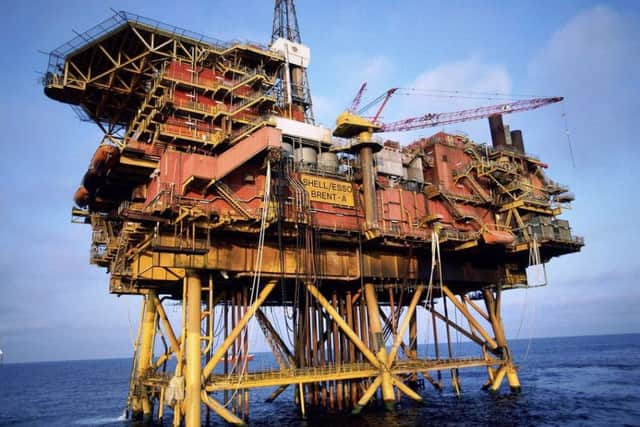Budget 2017: Tax break for faltering North Sea oil industry
Philip Hammond said the industry would benefit from Transferable Tax History, a measure designed to encourage investment in the North Sea.
His announcement came as figures published in conjunction with the budget by the Office for Budget Responsibility (OBR) highlighted the challenges faced by the off-shore oil industry.
Advertisement
Hide AdAdvertisement
Hide AdAccording to the OBR, downgraded forecastss for oil and gas revenue would amount to just £700 million in 2017/18, a figure far below the £10 billion recorded when the industry was at its peak.


Forecasts for future years showed no improvement with revenues falling to £500 million in 2018/19 and 2019/20 before falling to £400 million in 2020/21.
A slight rally will see revenues go back up to £500 million in 2021/22 followed by an increase back to £700 million in 2022/23.
The OBR’’s “Economic and Fiscal Outlook” paper said: “We have revised down our forecast for UK oil and gas revenues by £0.4 billion a year on average since March. That largely reflects a lower outlook for sterling oil prices (due to a lower dollar oil price in most years and a stronger pound) and weaker gas prices reduce revenues by £0.3 billion a year.”


It added: “ UK oil and gas revenues were close to zero in 2016-17 and are expected to reach just £0.7 billion in 2017-18, despite the move from losses into profits reported by many companies in the industry over the past year. Revenues have been boosted by a £9 a barrel rise in the price of oil between 2016 and 2017, while costs have been reduced by lower capital expenditure. However, the high level of trading losses accumulated within the industry in recent years means that these can be used to offset future profits. This will be a drag on receipts throughout the forecast period.”
Despite recent small increases in the price of oil, it will remain below $60 per barrel in the period up to 2022/23.
The Transferable Tax History will see tax breaks on old oil and gas fields sold to new owners, who can be put off buying them because of the high cost of decommissioning when they run out of oil.
The changes will see current owners pass on some of their Corporation Tax history so new owners benefit from extra decommissioning tax relief, making investing in an oil field more attractive.
Advertisement
Hide AdAdvertisement
Hide AdMairi Massey, director in PwC’s oil and gas tax team, said “all help to the sector” was welcome.
She said: “At the moment owners can claim tax relief for the cost of shutting down wells and clean up though these tax reliefs at present cannot be passed on to a new owner.
“The much anticipated Budget announcement, that legislation will be enacted to allow transfers from 1 November 2018, will be warmly welcomed by industry. This change should allow purchasers to obtain tax relief for decommissioning costs when the fields dry up and and help unlock more deals in late life assets in the UK North Sea.”
Deirdre Michie, Chief Executive of Oil & Gas UK, said: “We very much welcome the Chancellor’s action to enable the implementation of transferable tax history. This is a vital step that can bring in new investment to increase recovery from existing fields and fund fresh investment which is key to generating activity for our hard-pressed supply chain. It will also help extend the lives of many mature fields and postpone decommissioning. Currently existing owners of oil and gas fields are unable to pass their tax history onto a buyer. This means the buyer perceives the field to be less attractive commercially, partly because they are unlikely to be able to access the same level of tax relief than the current owner when decommissioning.”
Finance Secretary Derek Mackay said the help for the oil and gas industry was welcome but “overdue”.
